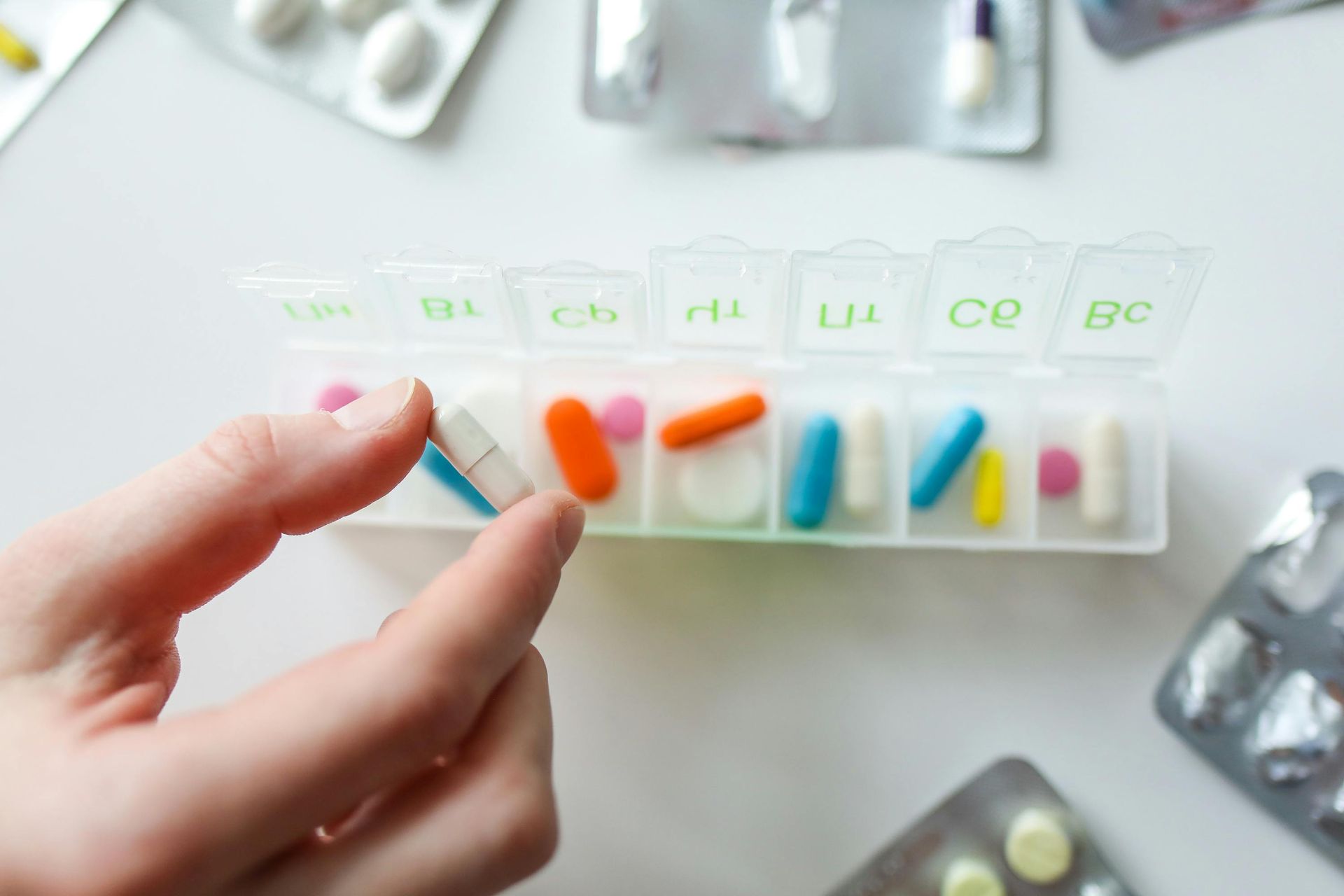Mental Health Awareness Month at The Albany Clinic

The Albany Clinic • May 16, 2024
May is Mental Health Awareness Month, a time dedicated to raising awareness and understanding of mental health issues.
This year, the National Alliance on Mental Illness (NAMI) has chosen the theme "Take the Moment" for Mental Health Awareness Month 2024. At Albany Clinic in Carbondale, Illinois, we understand the importance of this month.
We are committed to providing hope and healing to those struggling with mental health conditions like depression and PTSD.
The Roots and Significance of Mental Health Awareness Month
Mental Health Awareness Month, celebrated every May since 1949, has a rich history dedicated to bringing mental health into the spotlight. It began as an effort by the Mental Health America organization to educate the public on mental health issues, aiming to remove the misconceptions and stigma that often accompany mental illness.
The initiative was groundbreaking, marking one of the first times a concerted effort was made on a national scale to address mental health as a critical component of overall well-being. Over the decades, this observance has grown in scope and visibility, involving communities, healthcare professionals, and individuals in a united front to promote mental health education and support
Mental Health Awareness Month is significant because of its longevity and ability to adapt and remain relevant amid changing societal attitudes and medical advancements. It reminds us that mental health is an integral part of our lives, deserving of the same attention and care as physical health.
Through various campaigns, stories, and educational events, Mental Health Awareness Month continues to foster a better understanding of mental illness, encourages early intervention, and supports the development of effective treatments. This dedication to awareness and education helps to slowly dismantle the barriers of stigma, making it easier for individuals to seek assistance and for communities to offer support.
Understanding Mental Health and Its Impact
Understanding the significance of mental health is vital, as it encompasses our emotional, psychological, and social well-being. It influences how we think, feel, and act when faced with life's challenges.
Mental health conditions, such as depression and PTSD, are not just passing states of being upset or scared; they are serious conditions that can drastically impact every aspect of a person's life. These conditions can hinder one's ability to manage daily tasks, maintain healthy relationships, and even perform at work.
Recognizing the early signs and symptoms of PTSD, depression, and other mental health issues is a crucial step toward seeking timely help. Symptoms can vary widely but may include prolonged sadness, excessive fears or worries, extreme mood changes, withdrawal from friends and activities, and significant fatigue or low energy. Understanding the impact of these conditions underscores the importance of addressing mental health with the same urgency and care as physical health.
By shining a light on conditions like depression and PTSD, we aim to foster empathy, encourage open dialogue, and equip individuals with the knowledge needed to support themselves or others. It's about creating a foundation for stronger, healthier individuals and communities where mental health is no longer an obstacle to living a full, productive life.
Breaking Down Mental Health Stigma: What It Is and Why It Exists
Stigma, an invisible yet pervasive barrier, often stands between individuals and the mental health care they urgently need. At its core, stigma is an unwarranted mark of disgrace that sets a person apart from others.
When it comes to mental health,
stigma manifests through negative attitudes and beliefs that lead to discrimination, misunderstanding, and social exclusion. This societal mark of shame is deeply ingrained, stemming from a lack of understanding, fear of the unknown, and historical misconceptions about mental health conditions.
Why does stigma exist?
By educating ourselves and others, we can begin to dismantle the foundational causes of stigma. It's about replacing myths with facts and fear with compassion. Awareness and open dialogue are powerful tools in transforming how society views and treats mental health.
Take the Moment: Unpacking the Mental Health Awareness Month 2024 Theme
The 2024 theme for Mental Health Awareness Month, "Take the Moment," is a powerful call to action that underscores the importance of mindfulness and self-care in our fast-paced world. It's an invitation from the National Alliance on Mental Illness (NAMI) to every individual, urging us to pause amidst our busy lives and check in with our mental well-being.
This theme highlights the significance of recognizing and embracing those moments that call for a mental health check, whether it's seeking solace in a hobby, reaching out for professional help, or simply taking a breath to acknowledge our feelings.
"Take the Moment" serves as a reminder that taking time to care for our mental health is not only beneficial but essential. It's about noticing the signs, acknowledging our needs, and making conscious decisions to seek help and support when necessary.
In line with this, Albany Clinic champions the idea of embracing every moment as an opportunity to advance toward mental health wellness. We strive to reinforce the message that every step taken is a step closer to a healthier mind and a fuller life.
How Albany Clinic is Pioneering Innovative Mental Health Treatment
At the forefront of mental health care, Albany Clinic stands out with its revolutionary approach to treating some of the most challenging cases of depression and PTSD. Understanding that each patient's journey is unique, we offer a range of innovative interventions tailored to provide the most effective relief for treatment-resistant conditions.
Our clinic proudly utilizes Intravenous (IV) Drug Infusion Therapy with Ketamine, Esketamine Nasal Spray (SPRAVATO®), Stellate Ganglion Block, and Transcranial Magnetic Stimulation (TMS) therapy. These advanced treatments are grounded in the latest research and clinical trials and demonstrate significant symptom improvements for individuals who have not responded to conventional therapies.
Our commitment to incorporating cutting-edge technology and methodologies exemplifies our dedication to advancing mental health care. By providing these specialized services, Albany Clinic offers hope to those in need and contributes to the broader understanding and acceptance of alternative mental health treatments.
Our team of professionals is deeply passionate about making a difference in the lives of our patients and works tirelessly to guide them toward a path of recovery and resilience.
The Importance of Seeking Help: Albany Clinic's Role in Your Mental Health Journey
Navigating the path to mental wellness can often feel like an uphill battle, especially when dealing with conditions like depression and PTSD that resist traditional treatment methods.
At Albany Clinic, our approach is rooted in the belief that everyone deserves access to innovative and effective care. With a suite of advanced treatments, we are well-equipped to offer new hope to those who have found themselves at a standstill with other therapies.
Our team of professionals is knowledgeable, compassionate, and committed to understanding your unique situation. We know that reaching out for help is a big step. Rest assured, from the moment you walk through our doors, you're supported by experts who are focused on tailoring a treatment plan that aligns with your specific needs and health goals.
At Albany Clinic, your journey toward healing is a collaborative effort. We're with you at every step, providing guidance, support, and the latest in mental health care innovations.
Embrace the Moment with Albany Clinic: Find Mental Health Treatment in Carbondale Illinois Today
As Mental Health Awareness Month unfolds, it presents a perfect opportunity for each of us to reflect on our mental well-being and take proactive steps toward nurturing it.
The Albany Clinic, situated at the heart of Carbondale, Illinois, is a haven of innovation and support for those grappling with depression and PTSD, particularly when traditional treatments haven't yielded the desired outcomes. Our specialized services are at the forefront of mental health care, offering new avenues of hope and healing.
Taking the initial step to seek support may seem daunting, but remember, it's the first stride toward reclaiming your well-being and rediscovering joy in life's moments. This Mental Health Awareness Month, let's embrace the opportunity to prioritize our mental health, understanding that it's okay to seek help and that doing so is a sign of strength, not weakness.
If you or a loved one needs mental health support,
contact us today to learn how we can help you get back on track to living a life you love. Together, let's move towards a future where mental well-being is within reach for everyone.
35 Albany Rd. Suite A Carbondale, IL 62903
Phone: (888) 804-4330






